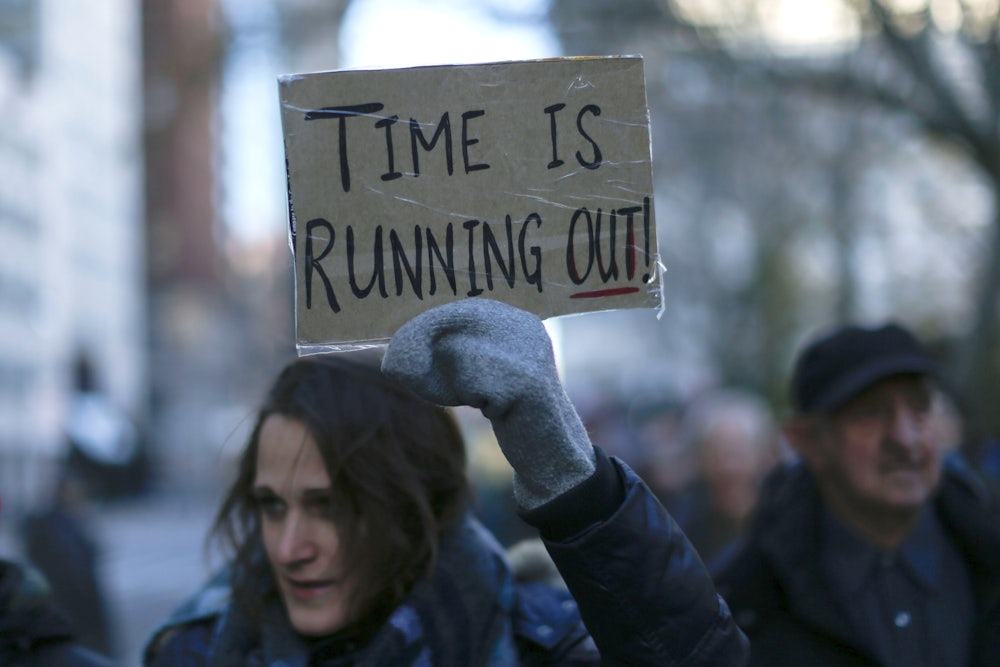Some climate change activists oppose doom-and-gloom rhetoric. They know that, if we don’t reduce greenhouse gas emissions quickly, the planet will soon become more habitable to flesh-eating bacteria than for human beings. But focusing too much on that risk promotes widespread hopelessness, they argue. And without hope, there will never be action.
This logic is understandable in principle, but feels increasingly deluded in practice. The Trump administration has all but dismantled U.S. climate policy. Emissions are still rising globally, with no sign that the world’s fastest-growing emitters, notably China, America, and India, are slowing down. As the executive director of the International Atomic Agency tweeted on Monday:
We expect energy-related CO2 emissions will increase once again in 2018 after growing in 2017 pic.twitter.com/rb0Em2folC
— Fatih Birol (@IEABirol) October 8, 2018
Also on Monday, the world’s most influential climate research body released a report stating we only have 12 years to stop global warming of more than 1.5 degrees Celsius above pre-industrial levels—the point at which irreversible sea level rise, widespread food shortages, and massive coral reef die-offs will start to occur.
Written by 91 researchers on behalf of the U.N Intergovernmental Panel on Climate Change, Monday’s report makes the case that allowing 1.5 degrees of warming is at least far better than allowing an increase of 2 degrees, which is the current goal of the Paris agreement. Only 70 to 90 percent of the world’s coral reefs would be wiped out under a 1.5 degree scenario, for example, but at 2 degrees almost all coral species would be gone. At 1.5 degrees, fisheries would only lose 1.5 million tons of fish per year, compared to more than 3 million tons at 2 degrees. Far fewer people would be exposed to malaria, dengue fever, and other diseases under a 1.5 degree scenario, and some low-lying island nations might not be wiped out.
Achieving this goal, however, requires rapid and massive global changes. Greenhouse gas pollution must be reduced 45 percent from 2010 levels by 2030—and then by 100 percent by 2050.
This goal is technically achievable, according to both the report and Paul Romer, who won the Nobel Prize in Economics on Monday for his work on climate policy solutions. “It is entirely possible for humans to produce less carbon,” he said receiving the award, which he shared with William Nordhaus. “Once we start to try to reduce carbon emissions, we’ll be surprised that it wasn’t as hard as we anticipated.” Technological advancements in efficiency, combined with massive cultural shifts toward sustainability, could rapidly reduce human demand for energy. The world’s biggest governments could place heavy taxes on carbon dioxide emissions to reduce the incentive to consume. They could also heavily invest in reforestation, biofuels, and carbon capture, an unproven technology for taking carbon out of the atmosphere.
But very few people, scientists least of all, see these things happening by 2030. “Given the present political debate, I don’t see much chance of these near-term cuts happening, even in places that take climate very seriously,” said Andrew Dessler, a climate scientist at at Texas A&M University. Penn State climate scientist Michael Mann agreed. “As I’ve stated before, 1.5 degrees Celsius is probably not realistically on the table,” he said. “We’re better focusing on achievable targets.”
Some might caution against these statements. Because when scientists and pundits say that 1.5 degrees Celsius is off the table, they tell the public that humanity will fail to save the coral reefs, the fisheries, and millions of people in developing countries, no matter what they do. They take away hope—and without hope, the public will resign themselves to doing nothing.
But it’s folly to rely on hope that is demonstrably false. “The whole idea that everything’s going to work out isn’t really helpful, because it isn’t going to work out,” said Kate Marvel, a climate scientist at the NASA Goddard Institute for Space Studies. Climate change is going to worsen to a point where millions of lives, homes, and species are put at risk, she said. The only thing humans can do is decide how many lives, homes, and species they’re willing to lose due to climate change—how long they’re willing to allow their respective governments to stall on what we know to be technically achievable.
Action relies on courage, not hope. “You shouldn’t need the guarantee of a happy ending to do what you know to be right,” Marvel said. Monday’s U.N. report gives us no logical reason to be optimistic about the planet’s survival, and no logical reason to hope. But pessimism just might convince enough people about the urgency of climate change, and encourage them to find the resolve to join the fight.
